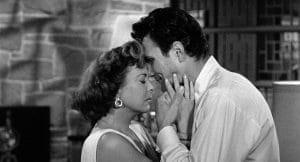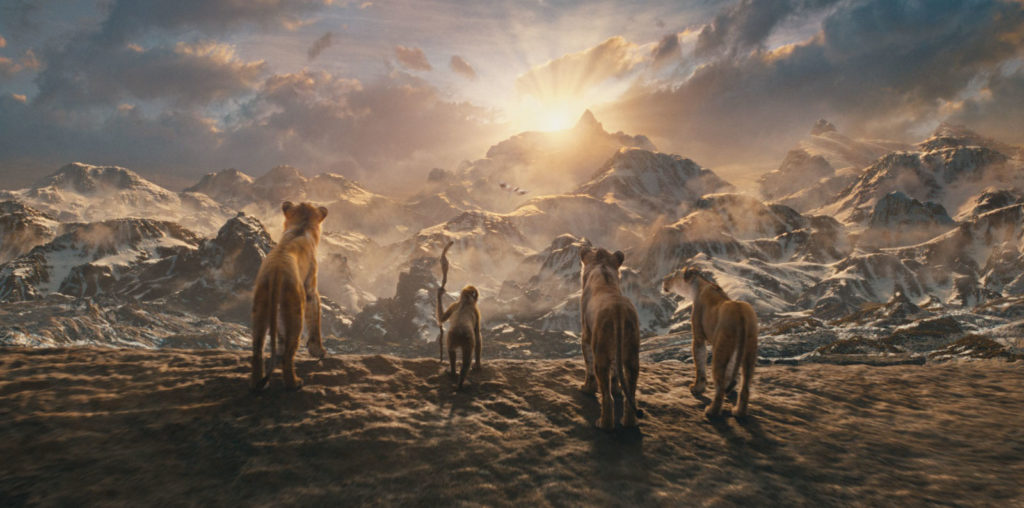
Adapting a stage play to the screen can be tricky. Plays are often confined to a single setting and dialog may include speeches that are effective on the stage but sound long-winded in movies. So, putting Clifford Odets’s 1949 stage drama The Big Knife on the screen might have seemed like a risky bet for director Robert Aldrich. But this noir-ish living room drama, which is enjoying a new Blu-ray release by Arrow Video, still crackles with life.
Fortunately, an outstanding cast helps make the transition from stage to screen a success. The story involves Hollywood movie star Charlie Castle (Jack Palance) whose marriage is on the rocks and is facing great pressure from his employer to sign a new contract that will ensure he continues to act in bad movies for the next seven years, the prospect of which fills Charlie with feelings of dread and loathing. His estranged wife Marion (Ida Lupino) is on the brink of making their split final, and makes it clear that if Charlie signs the contract their marriage is over. On top of that, there’s a dark secret that lurks in the background, threatening to topple Charlie’s personal life and career.

“…a dark secret that lurks in the background, threatening to topple Charlie’s personal life and career.”
Palance’s performance is spot on as the troubled golden boy of Hollywood, and there are really no weak links in this cast. Ida Lupino, in one of her last leading roles, is first rate as Charlie’s long-suffering wife, and Wendell Corey is quietly sinister as the film studio operative with ice water in his veins. Although the dialog can sound dated and unnaturally poetic, the deliberate, sometimes melodramatic way that actors deliver their lines grows on you after a while. The Blu-ray disc offers a sharp, all but unblemished print of the film. The disc’s special features include a short film on Saul Bass, the groundbreaking graphics designer who created the title sequence for this and other classic films.
This was the second of two Aldrich films released in 1955, both of which could be called films noir, but that’s where all similarities between the two end. The first was the Cold War noir masterpiece, Kiss Me Deadly, based on a Mickey Spillane detective novel of the same title, and transported from the mean streets of New York to the City of Angels.
On the exceptional commentary track that accompanies The Big Knife, critics Glenn Kenny and Nick Pinkerton point out that a boxing theme is maintained throughout the film. The first shot we see is Charlie sparring with his trainer Mickey (Nick Dennis), who also played Nick Va Va Voom, the mechanic in Kiss Me Deadly. Charlie, clad in a robe through much of the film, looks like a boxer catching his breath between rounds. When Charlie is brow-beaten into submission by bombastic studio chief Stanley Shriner Hoff (Rod Steiger), the demoralized Charlie seems to collapse in defeat.

“…bullies those around him before lapsing into a maudlin tantrum that would’ve made Sarah Bernhardt uncomfortable.”
Speaking of Steiger’s performance, this one must have set new standards for on-screen histrionics. The bellicose Shriner Hoff, allegedly modeled after Columbia Pictures studio chief Harry Cohn, alternately rages at and bullies those around him before lapsing into a maudlin tantrum that would’ve made Sarah Bernhardt uncomfortable. It has to be one of the most over-the-top performances in all of screendom and should not be missed.
As the noose of pressures from all sides tightens around Charlie’s neck, the bit players in his life, his agent, the studio PR flack, the gossip columnist looking for a juicy scandal to print and other hangers on, treat him like a commodity that can be exploited for their own benefit.
The Big Knife is Odets’s view of Hollywood as a town without a heart that annihilates artistic ambition and ruins lives, all of which was also seen in the Coen brothers’ Barton Fink, a send-up of Odets’s time in Hollywood.
Among playwrights and authors lured to Los Angles in the last century, this view of the industry is not uncommon. Kenny and Pinkerton point out that along with Odets, F. Scott Fitzgerald, Arthur Miller and George S. Kaufman, among others, all took their swings at Tinseltown. Each of them was lured to the city by hefty paychecks, and all exacted their revenge in poison pen tributes to the movie making capital. In this case, however, bitterness bred an enjoyable, though tragic, story that ought to be on the list of everyone who can’t get enough dark tales about Hollywood.

The Big Knife (1955) directed by Robert Aldrich, written by Clifford Odets (stage play) adapted to the screen by James Poe, starring Jack Palance, Ida Lupino, Wendell Corey, Jean Hagen, Rod Steiger, Shelly Winters, Ilka Chase, Everett Sloane, Wesley Addy and Paul Langton.
8 out of 10
https://youtu.be/pFbWxJB14Zw


When I was ten, back in 1955 a buddy of mine went to see this film with his parents. The next day, this friend told me that The Big Knife was the dullest movie he’d ever seen. I waited until 2019 to see it for myself. Guess what? He was right 64 years ago! This had to be the biggest waste of time I’d ever spent, watching a movie! This may have been a good play on Broadway, although events have proven otherwise given the poor reviews for the Bobby Carnavale flop of late. I’d rate it a minus five.
Jack Palance was never a great actor, and Steiger was well known for overacting. Both did performances that underlined their weaknesses. Ilka Chase was the best of this bunch of rotting hams, and she is mercifully onscreen for less than ten minutes.